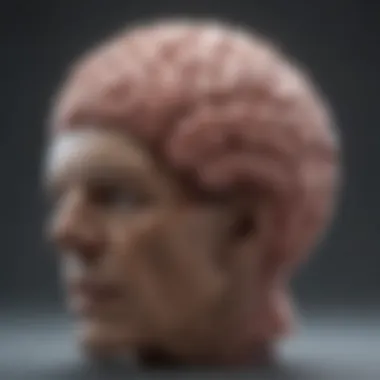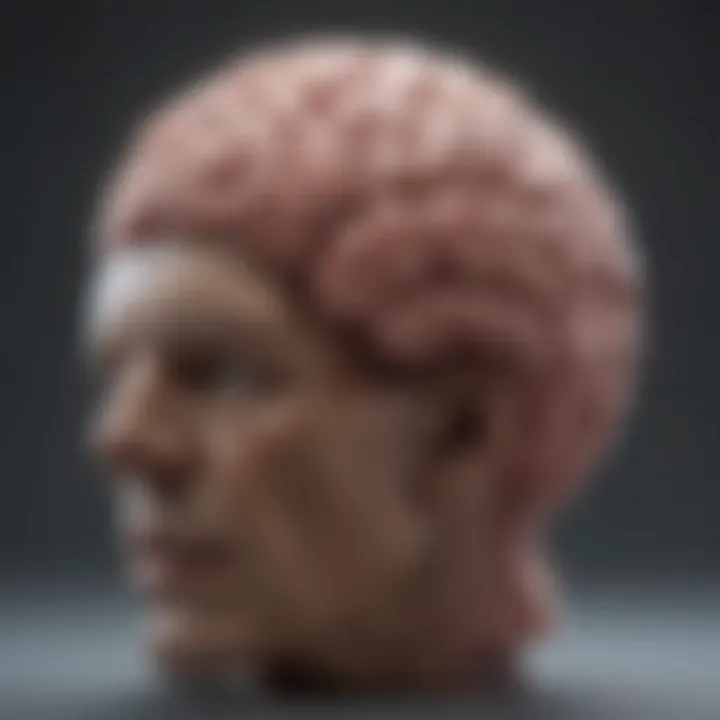Understanding Dementia: Insights into Cognitive Decline


Intro
Dementia represents a complex and diverse set of symptoms that primarily affects cognitive function. This condition poses significant challenges to individuals experiencing it and their families. As a progressive disorder, dementia can lead to a decline in memory, reasoning, and overall mental acuity. The implications extend beyond just cognitive abilities, affecting daily life and emotional health.
A deeper understanding of dementia is crucial for multiple reasons. First, it aids in early detection, which can be pivotal for managing and potentially slowing down the disease progression. Second, comprehending the types of dementia and their symptoms contributes to tailored interventions that can significantly enhance quality of life. Lastly, informed discussions around dementia can help in raising awareness and combating the stigma often associated with cognitive disorders.
The article aims to provide a thorough exploration of the subject. It will delve into the types of dementia, diagnostic methods, and potential treatment strategies, highlighting the importance of individualized care. By synthesizing existing knowledge, it seeks to equip readers—students, researchers, educators, and professionals—with a robust and nuanced understanding of dementia.
Defining Dementia
Defining dementia is crucial in the exploration of this complex and multifaceted condition. Understanding dementia is not just about recognizing its symptoms; it is about grasping the deeper implications it has on individuals and society. Dementia affects cognition and daily functioning profoundly, meaning that clarity on its definition can help foster greater awareness and empathy.
Clinical Definition
Dementia is defined clinically as a decline in cognitive function that interferes with daily life and activities. This encompasses memory, reasoning, language skills, and the ability to perform everyday tasks. According to the DSM-5 (Diagnostic and Statistical Manual of Mental Disorders), dementia is classified as a major neurocognitive disorder.
The clinical definition often includes various specific criteria. For a diagnosis, symptoms should be present for several months and should reflect a change from prior functioning. Conditions causing dementia can be reversible or irreversible, emphasizing the importance of thorough assessment procedures. This definition aids healthcare professionals in identifying the condition promptly and implementing appropriate interventions.
Common Misconceptions
Despite growing awareness, several misconceptions about dementia persist. Some people might think that dementia is a normal part of aging, which is not accurate. While age is a significant risk factor, dementia is not inevitable and can occur in younger individuals, too.
Another common misconception is that dementia and Alzheimer’s disease are synonymous. In truth, Alzheimer’s is a specific type of dementia, with its unique causes and symptoms. Additionally, many believe that all forms of dementia are untreatable or lead to imminent death, which neglects the fact that some forms are manageable and that supportive care can enhance the quality of life significantly.
"Recognizing and addressing misconceptions about dementia is vital. It not only aids in better understanding but also supports those affected by the condition."
Further clarification on these points contributes to reducing stigma and promoting informed discussions. Informed family members and caregivers are better equipped to provide support and advocacy, leading to a more compassionate response to those facing dementia.
Understanding dementia fully means acknowledging its complexity and the nuances behind its definition. This foundation can improve outcomes for those affected and foster a supportive environment.
Types of Dementia
Understanding the various types of dementia is vital for a comprehensive grasp of the condition as a whole. Each type of dementia comes with unique characteristics, symptoms, and progression patterns. Being aware of these distinctions allows for better diagnosis, treatment, and care strategies. It can also help in the identification of specific needs for individuals affected by different forms of this disorder. This section will explore four major types: Alzheimer's Disease, Vascular Dementia, Lewy Body Dementia, and Frontotemporal Dementia.
Alzheimer's Disease
Alzheimer's Disease is the most prevalent type of dementia, accounting for about 60-80% of all cases. This neurodegenerative disorder is typified by memory loss and a decline in cognitive functions. It mainly affects older adults, with risk increasing significantly after age 65.
The disease progresses through stages, beginning with mild memory impairment and advancing to severe cognitive decline. Patients often experience confusion, difficulty in completing familiar tasks, and changes in personality.
Key characteristics include:
- Plaques and tangles: Abnormal clumps of protein build up in the brain, disrupting communication between neurons.
- Brain shrinkage: Significant loss of neurons and connections occurs, affecting brain size and leading to cognitive deficits.
The impact of Alzheimer's is profound, not just on patients, but also on families and caregivers. Support systems are essential to manage the challenges faced.
Vascular Dementia
Vascular Dementia is the second most common type, resulting from reduced blood flow to the brain. This reduction in blood flow can occur after a stroke or through a series of mini-strokes. The symptoms vary widely depending on the area of the brain affected.
Key symptoms can include:
- Problems with memory
- Confusion
- Difficulty with attention
- Mood changes
However, unlike Alzheimer's, these symptoms may fluctuate more as individuals might experience sudden changes after events like strokes. Managing vascular dementia often involves controlling risk factors, such as hypertension and diabetes, to minimize further cognitive decline.
Lewy Body Dementia


Lewy Body Dementia encompasses both dementia with Lewy bodies and Parkinson’s disease dementia. It is caused by abnormal protein deposits in the brain known as Lewy bodies, which interfere with brain functions.
Symptoms can include:
- Visual hallucinations
- Sleep disturbances
- Fluctuating cognition
- Motor symptoms similar to Parkinson's Disease
People with Lewy Body Dementia may experience rapid shifts in alertness. This can lead to challenges in communication and daily activities. Treatments often focus on managing symptoms rather than altering the course of the disease itself.
Frontotemporal Dementia
Frontotemporal Dementia (FTD) primarily affects younger individuals, usually between the ages of 40 and 65. Unlike other types of dementia, FTD predominantly impacts the frontal and temporal lobes of the brain, which control personality, behavior, and language.
Symptoms may include:
- Personality changes
- Language difficulties
- Impulsive behaviors
- Social withdrawal
As the type of dementia progresses, individuals may exhibit significant behavioral shifts which can be distressing for families. Early diagnosis can aid in providing the necessary support, including therapy and care plans tailored to the individual's specific needs.
In summary, recognizing the specific types of dementia is critical in developing effective interventions and support strategies. Each form presents unique challenges, emphasizing the importance of tailored approaches to care.
Symptoms of Dementia
Understanding the symptoms of dementia is essential for identifying the condition and offering timely support. Symptoms impact not only the individual experiencing them but also family members and caregivers. Recognizing these symptoms early can aid in effective management strategies, enhancing quality of life for affected individuals.
Cognitive Symptoms
Cognitive symptoms represent a significant aspect of dementia. These include memory loss, difficulty in reasoning, and impaired judgment. Memory loss often manifests as challenges in recalling recent events or conversations. For example, an affected individual might repeatedly ask the same question or forget the names of familiar people. This disruption in memory can lead to confusion and frustration.
Other cognitive issues may also surface, such as difficulties in planning or completing tasks. Individuals may struggle to follow a sequence of steps in familiar activities, such as cooking or managing finances. Moreover, problems with language can involve struggling to find the right words or understanding conversations.
Emotional and Behavioral Symptoms
Dementia is not only about cognitive decline; it also influences emotional and behavioral health. Individuals may display signs of anxiety, depression, or irritability. A person previously known for their sociability may withdraw from social interactions, becoming despondent over their changing abilities.
Changes in behavior can include agitation, aggression, or increased confusion especially in new environments. It’s important to note that these symptoms can fluctuate, often worsening later in the day, a phenomenon referred to as "sundowning." Awareness of these emotional changes can help caregivers provide better support.
Impact on Daily Life
The symptoms of dementia substantially affect daily living. Individuals may find routine tasks becoming increasingly difficult, leading to reliance on caregivers. For instance, managing household chores, maintaining personal hygiene, or following once-familiar routines may no longer be manageable.
Additionally, social relationships often suffer due to the symptoms of dementia. Friends and family may struggle to communicate effectively with the individual, which can result in feelings of isolation for both parties.
Understanding these impacts is crucial for both caregivers and loved ones. By recognizing changes, they can adapt their strategies to support the individual through various challenges.
In summary, the symptoms of dementia encompass a range of cognitive, emotional, and behavioral changes. Awareness and understanding of these symptoms are vital for effective treatment, care strategies, and overall quality of life.
Causes of Dementia
Understanding the causes of dementia is essential for comprehending how this complex condition affects the brain and behavior. It lays the foundation for recognizing risk factors and developing preventive strategies. By examining the causes, we can also foster greater awareness of the mechanisms behind dementia and enhance discussions surrounding potential interventions.
Identifying the underlying causes of dementia helps in designing better diagnostic and treatment protocols. It promotes research initiatives aimed at developing therapies that address or mitigate these root factors. The complexity of dementia's etiology warrants a thorough exploration of both intrinsic and extrinsic elements influencing its onset and progression.
Genetic Factors
Genetic factors play a significant role in the development of various types of dementia. Some forms, such as Alzheimer's disease, have well-established genetic components. For example, individuals carrying the APOE ε4 allele are at a higher risk for Alzheimer's. This genetic predisposition not only increases vulnerability but can also influence the age of onset.
Research has identified specific gene mutations associated with familial Alzheimer's disease. These mutations include APP, PSEN1, and PSEN2. Those with these mutations often show symptoms earlier in life compared to the broader population. Therefore, understanding these genetic markers can assist in early diagnosis and intervention.
However, it is crucial to note that not everyone with these genetic risk factors will develop dementia. Environmental and lifestyle influences also contribute significantly, suggesting that having a genetic predisposition does not guarantee the condition.


Environmental Influences
Environmental factors are equally pivotal in the landscape of dementia. Various external elements such as lifestyle choices, educational opportunities, and exposure to toxins can significantly affect an individual’s risk.
- Lifestyle choices: Engaging in regular physical activity, maintaining a balanced diet rich in antioxidants, and focusing on mental exercises contribute positively to cognitive health. In contrast, smoking, excessive alcohol consumption, and sedentary lifestyles are linked to an increased risk.
- Toxins and pollutants: Exposure to air pollution and harmful chemicals may negatively influence brain health. Studies suggest that populations living in polluted areas tend to have higher incidences of dementia.
The interplay between genetic and environmental factors underscores the importance of a holistic view in dementia research and prevention. Promoting a healthy lifestyle can potentially mitigate the risk, even for those with a genetic predisposition.
Health Conditions Associated with Dementia
Certain health conditions can act as catalysts in the development of dementia. Understanding these associations helps caregivers and healthcare providers in identifying and managing risks associated with dementia.
- Cardiovascular diseases: Conditions like hypertension, diabetes, and high cholesterol can increase dementia risk. Proper management of these diseases through medication and lifestyle changes can diminish the likelihood of cognitive decline.
- Depression: There is a well-established link between depression and dementia. Individuals with a history of depression may face an elevated risk, prompting the necessity for mental health interventions in older adults to enhance cognitive health.
- Head injuries: A history of traumatic brain injuries, especially multiple concussions, has been related to a greater risk of developing neurodegenerative disorders.
"Understanding these health conditions and their connections to dementia offers a pathway to early intervention and potential prevention strategies."
In summary, the causes of dementia are multifaceted, encompassing genetics, environmental influences, and specific health conditions. Each of these elements interacts intricately to shape an individual's risk profile. Future research endeavors should continue to seek comprehensive insights into these causes, paving the way for better preventive and therapeutic measures.
Risk Factors for Dementia
Understanding the risk factors for dementia is crucial in both prevention and early detection. These indicators allow individuals, healthcare providers, and families to recognize who may be at elevated risk and take proactive measures. Knowledge about these elements can lead to better management and treatment options, enhancing the quality of life for those affected.
Age and Gender
Age is one of the most significant risk factors associated with dementia. As individuals age, the likelihood of developing various forms of dementia, particularly Alzheimer's Disease, increases. Studies suggest that while dementia can occur in younger individuals, the prevalence notably rises after the age of 65. This statistic necessitates a focus on geriatric care and extensive research targeting older populations.
Gender also plays a role in dementia risk. Research indicates that women are more often affected than men. This disparity may result from biological differences, with hormonal changes potentially influencing cognitive decline. Additionally, women typically live longer than men, increasing their exposure to age-related risks. Understanding these gender dynamics is important for tailored healthcare approaches.
Lifestyle Choices
Lifestyle choices can significantly influence the risk of developing dementia. Factors such as diet, physical activity, and smoking habits play a key role in cognitive health. Engaging in regular physical exercise is linked to reduced risk, as it promotes cardiovascular health and blood flow to the brain.
A diet rich in fruits, vegetables, whole grains, and healthy fats, like the Mediterranean diet, is associated with better brain health. Conversely, high sugar and saturated fat intake can contribute to cognitive impairment.
Additionally, avoiding smoking is crucial, as tobacco use has been linked to an increased risk of dementia. Education on healthy lifestyle choices is vital for reducing risk and fostering resilience against cognitive decline.
Comorbidities
Comorbidities, or the presence of more than one medical condition, can also elevate the risk of developing dementia. Conditions such as diabetes, cardiovascular disease, and obesity are notable contributors. These health issues not only affect physical health but can also impair cognitive function over time.
For example, diabetes management is often linked to maintaining cognitive abilities. Uncontrolled blood sugar levels can lead to vascular damage, which is a risk factor for vascular dementia. Similarly, cardiovascular diseases restrict blood flow and oxygen to the brain, increasing the likelihood of cognitive decline.
Having an awareness of these comorbid conditions is essential for effective preventive strategies and management plans.
"Recognizing risk factors allows for targeted interventions that can delay or potentially prevent dementia development."
Diagnosis of Dementia
Diagnosing dementia is a critical process within the framework of understanding this complex condition. Early and accurate diagnosis not only provides clarity for families but also helps in planning appropriate interventions. Dementia can be difficult to identify in its initial stages due to the subtlety of its symptoms. As a result, healthcare providers must utilize a systematic approach that includes various diagnostic criteria, assessment tools, and the expertise of specialists.
Diagnostic Criteria
The diagnostic criteria for dementia involve a careful evaluation of cognitive functioning and a thorough patient history. It evaluates several cognitive domains such as memory, reasoning, and communication skills. The criteria used commonly include the DSM-5 (Diagnostic and Statistical Manual of Mental Disorders) guidelines and the ICD-10 (International Statistical Classification of Diseases). According to these systems, the diagnosis of dementia requires:
- Cognitive decline: Evidence of significant cognitive decline from a previous level of performance.
- Interference with daily life: The cognitive issues interfere with independence in everyday activities.
- Not due to other conditions: Symptoms must not be exclusively during the course of delirium or other mental disorders.
It is essential that these criteria apply not only to the patient but also consider observable behaviors by caregivers and families to accumulate a holistic understanding of the individual's cognitive status.


Assessment Tools and Tests
Assessment tools are fundamental in the diagnosis of dementia, offering structured methods for evaluating cognitive health. Commonly used tools include:
- Mini-Mental State Examination (MMSE): This is a widely used test that assesses various cognitive functions including basic math, memory, and language.
- Montreal Cognitive Assessment (MoCA): A more sensitive test that screens for mild cognitive impairment and associated dementia.
- Neuroimaging: Techniques like MRI (Magnetic Resonance Imaging) or CT (Computed Tomography) scans help visualize any brain changes indicative of dementia.
Regularly using these tools in conjunction helps clinicians develop a clearer picture of the patient’s cognitive abilities. The selection of tools can depend on factors such as the suspected type of dementia and the setting in which the diagnosis occurs.
Role of Neurologists and Psychiatrists
Neurologists and psychiatrists play distinct yet complementary roles in the diagnosis and management of dementia. Neurologists focus on the brain's structural and functional aspects, interpreting results from neurological tests and imaging studies to identify any brain pathology that may be contributing to cognitive decline. Psychiatrists, on the other hand, focus more on the psychological aspects and behavior changes associated with dementia.
Both specialists collaborate to develop a comprehensive management plan tailored to the patient’s condition. Furthermore, their collaboration facilitates a timely referral for support services, which may include therapies or counseling. This joint approach is vital in minimizing the impacts of dementia, ensuring that both physiological and emotional needs are addressed effectively.
In summary, a thorough diagnostic process involving precise criteria, effective assessment tools, and the skilled analysis of specialists greatly enhances the understanding of dementia. This paves the way for tailored interventions that improve quality of life for patients and support for families.
Treatment Options
Effective treatment options for dementia are crucial for managing the disease. The goal is to improve quality of life for patients and their families. Understanding these options can help caregivers make informed choices. It is important to consider not only the clinical aspects but also the personal preferences of the patient.
Pharmacological Interventions
Pharmacological interventions play a key role in dementia treatment. Various medications aim to alleviate symptoms or slow the progression of the disease. Common drugs include donepezil, rivastigmine, and galantamine. These medications are mainly used in Alzheimer's disease and work by increasing levels of neurotransmitters that are often deficient in dementia patients.
It's essential to note that while these medications can offer benefits, individual responses can vary. Some patients may experience side effects like nausea or diarrhea. Therefore, it’s crucial for healthcare providers to monitor these reactions carefully. Research continues into new pharmacological options and combinations that might offer better outcomes for different subtypes of dementia. The involvement of neurologists can provide tailored medication strategies depending on individual patient profiles.
Non-Pharmacological Approaches
Non-pharmacological approaches are also vital in treating dementia. These methods can include cognitive therapies, behavioral strategies, and environmental modifications. Cognitive stimulation therapy involves engaging patients in activities that promote thinking and memory skills. This can delay cognitive decline and enhance emotional well-being.
Additionally, behavioral strategies can help manage symptoms such as agitation or depression. Simple adjustments in routine or environment can have significant effects. For example, consistent daily schedules help patients in understanding and processing their days better.
Dementia care should be holistic, addressing the psychological, emotional, and social needs of individuals.
There is also growing evidence that physical activity positively affects cognitive health. Exercise not only promotes overall well-being but can also improve mood and reduce anxiety in patients.
Importance of Supportive Care
Supportive care is an often-overlooked but essential component of managing dementia. This aspect emphasizes the need for a strong support system for both patients and caregivers. Supportive care includes counseling, education, and respite services. These resources can empower caregivers with the tools they need to cope with the challenges of dementia care.
Families also benefit from understanding the nature of dementia. Educating them about the disease instills confidence in handling difficult behaviors and makes them better advocates for their loved ones. Moreover, joining support groups can help caregivers exchange experiences and obtain emotional support. The well-being of caregivers directly impacts the quality of care they can provide.
Future Research Directions
The landscape of dementia research is rapidly evolving, as new insights and innovative approaches emerge. Understanding future research directions in this field is crucial for addressing the growing challenge that dementia poses to individuals and societies. As researchers delve deeper into its complexities, they uncover potential therapies and improve existing diagnostic methods. This exploration not only enhances understanding but also opens pathways for better care and management of dementia.
Emerging Therapies
The search for effective therapies for dementia has gained momentum, centering on both pharmacological and non-pharmacological strategies. Emerging therapies focus on targeting the underlying mechanisms of dementia. For instance, amyloid-targeting drugs are presently being researched for their potential to alter the course of Alzheimer’s disease. Researchers explore how modulation of tau proteins might also play a role in reducing cognitive decline.
In addition to drug therapies, behavioral interventions are gaining attention. Cognitive training exercises and lifestyle changes, such as diet and physical activity, are emerging as vital components in managing symptoms of dementia. Addressing psychological aspects through therapy can also offer significant benefits. Evidence-based practices are essential in evaluating their effectiveness, facilitating a shift toward more holistic care approaches.
Role of Technology in Management
Technology is revolutionizing the way dementia is managed. Remote monitoring systems and mobile applications provide tools for caregivers and patients alike. These innovative solutions enhance patient engagement and allow for personalized care plans. For instance, virtual reality is being explored as a means of cognitive stimulation, offering users an immersive experience that may mitigate symptoms.
Wearable devices also play a critical role in managing dementia. They can track daily activities, detect falls, and gather important data on a patient's health status. This data, when analyzed, can help inform treatment decisions and encourage timely interventions. Moreover, artificial intelligence is beginning to shape diagnostic and therapeutic landscapes, offering the promise of more precise and efficient processes.
Tracking Progress in Biomarker Studies
Biomarkers are crucial in understanding and treating dementia. They can provide valuable insights into disease progression and treatment efficacy. Tracking these markers presents several advantages: early diagnosis, more tailored therapy options, and better prediction of outcomes. Researchers are investing significantly in identifying specific biomarkers for different types of dementia, allowing for differentiation between conditions that share similar symptoms.
Ongoing studies are assessing the validity of various biomarkers, such as brain imaging techniques and cerebrospinal fluid analyses. These approaches aim to enhance our understanding of pathology before clinical symptoms manifest. By bridging the gap between basic science and clinical application, tracking progress in biomarker studies holds significant potential in revolutionizing dementia care.
"Investing in research today shapes the future landscape of dementia treatment and care, with the potential to improve countless lives."



